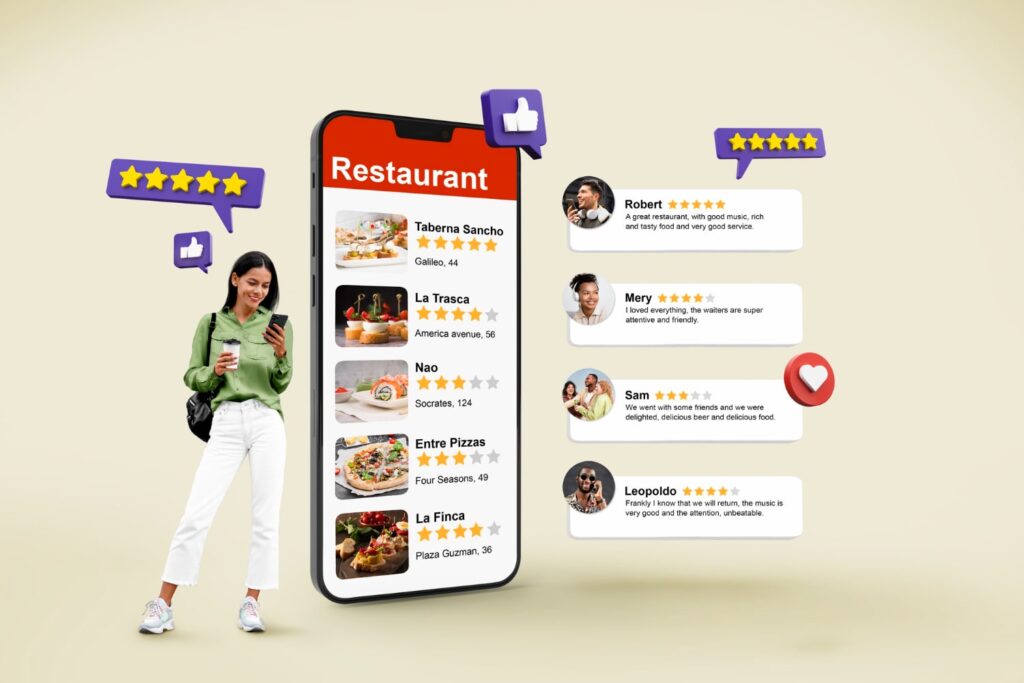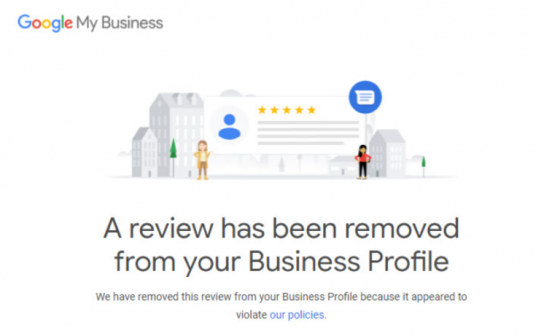
Source: Freepik
Buying Google reviews might seem like an easy shortcut to building online reputation and drawing in sales. After all, a Google Business Profile with glowing, 5-star ratings can boost visibility for locals in the neighborhood and attract more footfall to your business, right? Well, yes (you get an initial boost, but it doesn’t always last) and no (because it’s very risky, and you stand to lose customers, if not the entire business).
Many businesses feel the temptation to buy Google business reviews, hoping to instantly improve their profile. There’s a psychology behind review buying. Studies show that 82% of consumers read online consumer reviews (OCRs) for local businesses. That’s not all. 91% of consumers agree that seeing positive reviews makes them more likely to patronize a business.
So, fake reviews may seem like a quick fix. Before you go on a five-star shopping spree though, there are some major risks to consider.
Google’s Policy on Buying Reviews
Buying Google reviews could appear to be an alluring shortcut. However, Google’s guidelines make it crystal clear: any form of fake or misleading reviews is a big red flag, especially if paid or incentivized. Here is what Google says concerning review buying and fake user experiences:
- Paying for reviews: Businesses cannot offer money, discounts, gifts, or other rewards for reviews.
- Creating fake reviews: Reviews must represent the genuine experience of the user. This means that reviews cannot be written by someone who has never used the product or service or by someone affiliated with the business.
- Review gating: Businesses cannot selectively solicit positive reviews from customers. For example, businesses cannot survey customers and ask them to post a review if they had a positive experience while asking them to share details of their feedback privately if they had a negative experience.
Google’s user contributed content policy clearly states it does not allow merchants listed on its platform to:
“Solicit or encourage the posting of content that does not represent a genuine experience.” It also warns that merchants must not “offer incentives – such as payment, discounts, free goods and/or services – in exchange for posting any review or revision or removal of a negative review.”
There are many more, and violating these policies doesn’t come with soft punishments. It could lead to profile suspensions, severe ranking drops, or even legal repercussions.
Penalties for breaking Google’s rules are steep. Many businesses have learned the hard way that faking reviews to appear more credible can backfire quickly—leading to lost trust and reduced visibility online. And the chances of being cut by Google’s advanced algorithm are about 60-80%. Finally, if customers catch on, trust goes out the window.
In other words, buying reviews may seem appealing, but Google frowns on it in the long run. It’s much better to build a business reputation organically and with trusted hands and tools than taking shortcuts.
What Counts as a Fake or Paid Review?
When it comes to buying Google reviews, any review that’s not based on a real experience with the business is off-limits. Fake reviews aren’t just misleading; they’re a red flag for Google. So, what makes a review “fake” or “paid”? Here’s a quick look:
- Buying or selling reviews: This is the classic scenario: someone buys 5-star Google reviews, hoping for a quick visibility boost. A restaurant owner pays a freelancer to write glowing reviews about their “world-class” pasta. But the freelancer’s never even stepped foot in the place. This kind of manipulation is exactly what Google cracks down on. Whether it’s buying 5-star Google reviews or selling fake ones, this is a clear violation. Google sees it as a manipulation of their platform, undermining the authenticity of reviews.
- Offering incentives for reviews: Discounts, freebies, or any special perks in exchange for a review is a no-no in Google’s book. This kind of incentivized review can feel deceptive to consumers, as it distorts the review landscape and misleads customers who are searching for honest feedback. Google enforces this rule to ensure reviews are unbiased and accurate reflections of actual customer experiences.
- Exchanging goods or services for reviews: Think you can simply swap a service or product for a positive review? Think again. Google flags this as a form of manipulation, as it shifts the review focus from genuine experience to a “rewarded” opinion. If caught, businesses risk penalties and profile downgrades.
- Fake reviews from employees, family, or friends: It may seem harmless to have your inner circle vouch for you, but Google’s algorithms can catch the connections. Reviews from employees or relatives aren’t considered genuine and can lead to penalties. Even if these reviews are positive, they lack the authenticity Google wants for its platform.
- Posting reviews on behalf of customers: Sometimes, businesses may think they’re helping customers by posting reviews on their behalf. But unless the customer is writing and submitting it directly, Google flags it as inauthentic. This rule keeps reviews transparent and unaltered by anyone but the customer.
- Reviews from people who haven’t used the product or service: A lot of people hire people to rave about a product they’ve never touched. It happens a lot on Amazon. If it sounds too good to be true, Google probably thinks so too. They monitor for patterns that don’t align with genuine customer feedback, and reviews from people with no actual experience raise suspicions.
According to a study, about 30.9% of online reviews are fake, with false reviews influencing large numbers in global sales annually. However, Google’s guidelines are designed to protect users from falling for these “too good to be true” reviews. Businesses trying to buy Google business reviews may think it’s a fast win, but fake reviews can lead to penalties or account suspensions. Plus, once customers sense something’s fishy, trust is hard to rebuild.
In short, if it isn’t based on a real experience, it’s risky territory. In fact, there are several ways to manage online reputation and review buying is never part of it.
Legal Implications of Buying Google Reviews
Buying Google reviews doesn’t just break Google’s rules; it can get you in legal hot water, too. In many places, consumer protection laws consider fake reviews to be false advertising. Basically, if you’re paying for reviews, you’re playing with fire.
A study from the University of Baltimore found that in 2021, fake reviews swayed about $28 billion in U.S. spending—and a whopping $152 billion worldwide. And while the numbers might make it seem “worth it,” the risks are huge.
Case in point: the FTC uncovered a company that spent $250,000 on fake reviews, generating $5 million in sales. But getting caught costs them even more in penalties and reputation.
If the thought of quick profits sounds tempting, consider this: lawsuits, fines, and bans aren’t fun or cheap.
Consumer Protection Laws in the U.S.
The FTC in the U.S. is pretty strict about paid reviews. The agency labels fake or paid reviews as “deceptive advertising,” which opens the door to fines, lawsuits, and major reputation damage. Any review that doesn’t come from a real customer experience? It’s considered false advertising under U.S. law, which the FTC doesn’t take lightly. So, businesses that buy 5-star Google reviews could end up in court instead of at the top of search results.
International Regulations
The U.S. isn’t alone. Other countries, like the UK, Canada, and Australia, have tough rules against fake reviews. For instance, UK regulators treat fake reviews as misleading and illegal under consumer protection laws, and penalties can be severe. Similarly, in Canada and Australia, businesses caught using fake reviews face fines, legal action, or both. The goal is to protect consumers from deceptive marketing and keep the review landscape genuine.
Surgeon gets slapped with a $5 million penalty
Buying Google reviews may sound harmless, but real-life cases show it’s a costly risk. Many businesses have faced harsh penalties for manipulating their online ratings and reviews with fake customer experience documentation. And some of these stories are eye-opening.
Dr. Javad Sajan, a Seattle-based plastic surgeon, and his clinic, Allure Esthetic, are a prime example. Dr. Sajan got hit with a $5 million penalty in a ruling by the Washington State Attorney for running a massive fake review scheme. His team created fake profiles to post glowing reviews about his practice. And it didn’t stop there. They also pressured unhappy patients to delete negative reviews, even threatening them with legal action if they didn’t comply. The clinic also reportedly used NDAs to keep patients quiet and offered incentives for positive feedback.
The result is a massive fine, damaged reputation, and lots of unhappy customers who now feel deceived.
Another recent case involves Roomster, a roommate-pairing app. The FTC, along with six states, sued Roomster for buying 20,000 fake reviews to lure customers. Roomster allegedly created fake listings and paid for positive reviews to boost its image. It looked good on the surface, but once the FTC dug in, the truth came out—and now Roomster is facing serious consequences.
These cases serve as a reminder: buying Google business reviews might feel like an easy win, but it rarely ends well. The risks—penalties, lawsuits, and a tarnished reputation—far outweigh any short-term gains. Google reviews are best when they’re real because, as these cases show, faking it just doesn’t pay off in the end.
Other Consequences of Buying Fake Reviews on Google
If the legal risks of buying Google reviews weren’t enough to change your mind, there are plenty of other consequences to consider. The stakes go beyond fines or lawsuits. You could end up tanking your business’s online presence entirely. Here’s what else can happen.
Risk of Google Account Suspension or Profile Removal
Google doesn’t mess around when it comes to fake reviews. Violate their guidelines, and you’re not just risking a slap on the wrist. Google’s policies clearly state that accounts caught buying or using fake reviews may face suspension—or worse, profile removal.
Just when you think your listing is finally ranking high and customers are finding you easily. Then…poof! Your business disappears from search results. And getting back on Google’s good side is a long, uphill battle.
Reputational Damage and Loss of Customer Trust
Trust is everything in business. Once customers catch wind of fake reviews, faith in your business can crumble fast. A single bad headline or a few social media posts exposing your fake reviews can do massive damage.
Customers might even start questioning all your positive reviews, wondering, “What else isn’t real here?” Without a significant rebranding, it is difficult, if not impossible, to regain that trust. It’s often more costly than the quick boost those fake reviews provide.
Algorithmic Penalty
Google’s algorithm is designed to find and demote suspicious activity—including bought reviews. If you buy 5-star Google reviews and Google detects them, your profile’s ranking will take a big plummet.
For example, instead of appearing on the first page of search results, you could be buried far down where few customers venture. This means fewer views, fewer clicks, and, ultimately, fewer customers. All the SEO work in the world can’t save you once Google’s algorithm penalizes your profile.
Decreased Sales
Fake reviews might get a few clicks at first, but they won’t create loyal customers. Once people suspect your reviews are fake, trust is out the window.
54% of buyers won’t purchase a product if they believe feedback to be false. In short, buying Google reviews can turn potential customers away, not bring them in. And fewer customers mean one thing—lower sales.
Fines and Legal Fees
If caught, fines aren’t the only costs. Legal fees for defending against FTC fines or lawsuits can add up fast. For example, as a company, you could spend as high $250,000 on fake reviews, only to end up paying at least 10x in fines and legal costs. So, instead of boosting profits, buying fake reviews could drain your business account.
Difficulty Attracting Investors and Partners
Investors want businesses with credibility and growth potential. Fake reviews are a red flag for serious investors and partners. Imagine pitching to an investor who does a quick search, finds out you’ve been buying Google business reviews, and walks away. Even if your sales look good on paper, fake reviews can make you appear unreliable and risky—two qualities investors avoid.
The only way to escape a scenario like this would be to eliminate the actual business name, listing, and managing board. Tough decisions!
Reputation Recovery Cost
Repairing a damaged reputation isn’t cheap. To restore customer trust, you may need to dissolve the tainted brand, receive PR support, do extra marketing, or rebrand.
One bad story can stick around online for years, requiring consistent damage control. So, instead of spending money on a few quick 5-star reviews, your business could be stuck paying much more to rebuild trust in the long run. It’s a much better idea to learn how to effectively—and truthfully—manage your online reputation.
Summing Up
So, is buying Google reviews worth it? Not at all. Ultimately, it causes more issues than it fixes. The short-term gains just aren’t worth the long-term headaches. Real trust doesn’t come from a few bought 5-star Google reviews—it’s earned over time, and that’s what keeps customers coming back.
Once you pay for reviews, you, indeed, get a small boost in rankings and possibly even sales. But then customers start noticing things don’t add up. Maybe they have a totally different experience than all those five-star reviews promised. Maybe they begin noticing the tell-tale signs of fake reviews. Suddenly, instead of attracting loyal customers, you’re pushing them away. And pray you don’t get an email from the FTC. Worse, rebuilding that trust is way tougher than doing things the right way from the start.
The risk is real. Between fines, potential lawsuits, profile suspensions, and trust lost, it’s a gamble that rarely pays off in the long run.
If you’re serious about building genuine customer relationships, Synup helps businesses generate authentic reviews from actual customers—no shortcuts, no risks. Book a demo today to really take charge of your presence.
Also Read: “How Online Reputation Management Software Can Impact Your Online Presence”
Is It Legal to Buy Google Reviews? FAQs
Can Google detect fake reviews?
Absolutely. Google’s algorithms are trained to sniff out fake reviews. They look for patterns—like sudden floods of 5-star Google reviews, reviews coming from unrelated locations, or from a single IP address. If your business profile suddenly jumps in ratings thanks to “customers” from all over, Google notices. Google may delete suspicious reviews, demote your profile, or even suspend your account. Buying Google reviews might seem clever, but Google’s tech is always a step ahead.
What to do if someone leaves a fake Google review?
If you spot a fake review on your profile, report it. You can flag the review as “inappropriate” and let Google know why it’s misleading. You can also respond publicly, stating that the review doesn’t reflect a real experience with your business. This shows other customers you’re attentive and transparent. Just keep it cool. Engaging in a public spat only makes things worse.
What happens when you report a fake Google review?
When you report a fake review, Google investigates. If it aligns with Google’s criteria for removal, they’ll take it down, usually within a few days. But, be warned: Google’s review process isn’t instant. The process can take weeks sometimes, and they don’t remove reviews without proof. So, while reporting fake reviews helps keep things fair, it’s a process that takes patience.


